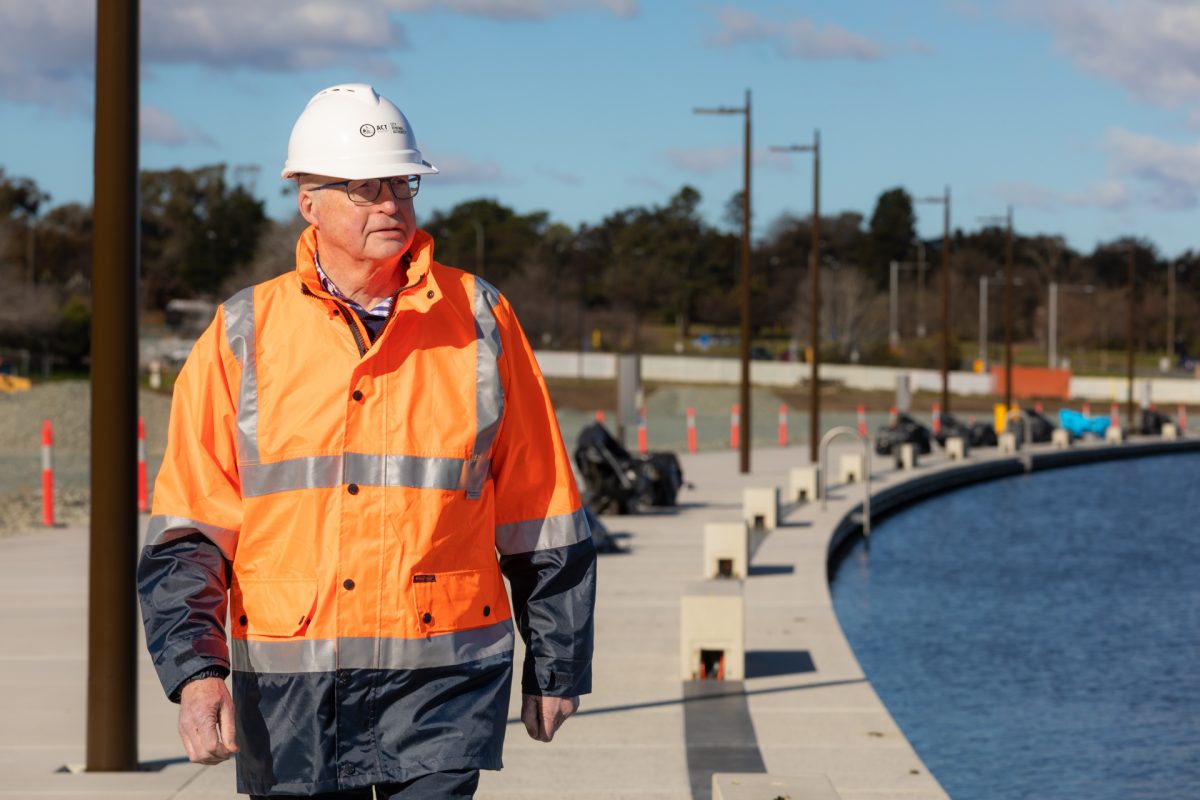
Under pressure: CRA CEO Malcolm Snow on the extended boardwalk at West Basin. Photos: Michele Kroll.
The agencies involved in the tender and contract process for the controversial Acton Waterfront project have been taken to task in a damning report from the ACT Auditor-General.
The audit report, which looked at agencies’ management and administration of the process from 2014 to 2020, adds to a growing critique of ACT Government procurement.
The report found that the work of the former Land Development Agency and the City Renewal Authority was ineffective, the Request for Tender (RFT) did not represent value for money and the CRA exposed the government to more risk than there needed to be.
It also criticised both agencies for a lack of public information and transparency about the project.
“The 2014 Request for Tender (RFT) was poorly designed,” the report found. “The risk and reward mechanisms of the procurement were changed during the tender process and again prior to contract execution.
“The RFT process did not provide for a satisfactory, fair and open competition that was capable of demonstrating value for money.”
The Acton Waterfront Project involves the reclamation of about three hectares of lake bed at Lake Burley Griffin’s West Basin, the extension of the boardwalk and the creation of a similar-sized area of urban park along the foreshore.
About five hectares of land behind the park will be developed for mixed residential and commercial use.
The project drew criticism from heritage and environmental groups, but the reclamation is now complete and the extended boardwalk is due to be opened to the public in October.
The audit report outlined a moveable feast of a contract in which the project and cost shrank and then grew, first under the Land Development Agency and then the City Renewal Authority.
Local civil engineering firm Chincivil won the tender in 2014.
The report said construction work was expected to cost $27.5 million and be completed by October 2016 but by the time the contract was executed in November 2015, the project had been scaled back and was expected to cost $9 million.
By February 2018, two-thirds of the works had been completed for $13.6 million, although this was for only one element of a revised project brief.
The contract, which all up changed 16 times, then added work from the original RFT, and by September 2020, the cost had blown out to $46.8 million, representing about two-thirds of the work originally planned in the RFT.
“The prospects of securing a value for money outcome from the procurement were severely compromised by the design of the RFT,” the report said.
Planning documentation also grossly understated the value of the procurement at times.
The audit report found that the RFT did not provide an adequate basis for executing the $9 million design and construction contract.
It said that after the execution of the contract, the Land Development Agency varied it with insufficient regard to value for money.
When the CRA assumed the contract on 1 July 2017, it did not robustly assess the risks of continuing with the contract against alternative options even though it would have been an opportune time to review the situation.

The reclaimed land and extended boardwalk at West Basin. The Acton Waterfront project lacked transparency.
The report also found that the LDA did not properly take into account the interests of the National Capital Authority.
“Two matters of importance to the National Capital Authority became apparent in mid-2015 after the completion of the Request for Tender (RFT): the closure of Barrine Drive; and compensation for relinquishing land development rights,” the report said.
“In order to resolve these matters the scope, timing and estimated cost of the Acton Waterfront Project have changed substantially. In planning the project’s procurement, the Land Development Agency did not appropriately anticipate and mitigate the risk of these changes. The approach to market was premature.”
Oversight of the procurement by the Land Development Agency Board and the City Renewal Authority Board was inadequate and the proponents’ interactions with the Government Procurement Board had also not been effective.
Auditor-General Michael Harris flagged a performance audit of the Government Procurement Board and its role in advising on major procurements.
The audit report made seven recommendations.
Opposition Leader Elizabeth Lee seized on the report as another example of significant issues with government procurement processes.
She said the report shows a complete failure of due process and significant transparency and governance issues when spending taxpayers’ money.
“How can the public have any confidence that ACT Government procurements are firstly above board and secondly represent value for money,” she said.
“This damning report comes on the back of recent issues with the Campbell Primary Modernisation project procurement and murky CIT contracts.”
Ms Lee said there was a systemic problem within the government that fostered a culture of secrecy.
“The Auditor-General points to areas under the control of the Chief Minister and he has some serious questions to answer, and he must come out and tell Canberrans what he is going to do to fix the problem,” she said.





















